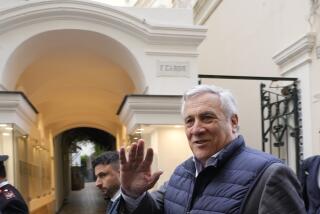There’s Not Much Left to Ban : Without European Help, Sanctions Impact Is Slight
WASHINGTON — President Reagan’s new sanctions against Libya represent a dramatic expression of U.S. outrage at its support for terrorism, but experts said Tuesday that they are unlikely to cause much damage to Col. Moammar Kadafi or his regime unless West European nations can be persuaded to take similar actions.
Even before Reagan ordered the suspension of virtually all commercial contacts, Washington had already severed most normal economic contacts with the Tripoli government. Although the President’s latest moves are more sweeping, there simply is not much left to ban because of earlier steps taken by Reagan and former President Jimmy Carter.
“I don’t think the Libyans are vulnerable at all as long as they maintain the same economic relations with Europe that they have had,” said Richard B. Parker, a former ambassador to Algeria, Lebanon and Morocco who is now on the staff of the Middle East Institute in Washington. “If the Europeans were to join us in sanctions, that would have some effect, but I don’t think they will.”
Reagan conceded the pivotal role of the Europeans when he told a news conference: “We call on our friends in Western Europe and elsewhere to join with us in isolating him (Kadafi). Americans will not understand other nations moving into Libya to take commercial advantage of our departure.”
Nevertheless, a survey of West European capitals reported by the West German news service Deutsche Presse-Agentur showed no support for sanctions against Libya. Nine of the 11 nations surveyed rejected the American proposal, while the two others said they have not yet considered the issue.
Reagan’s executive order was designed to sever almost all contact with Libya by Americans and American corporations.
All exports, imports and commercial contracts were banned. Airline and other travel links were severed. The estimated 1,500 Americans currently living in Libya were told, in effect, that they must come home by Feb. 1 or stay there permanently. Americans remaining in Libya after that would be subject to 10 years in prison if they later returned to the United States.
The greatest impact on the Libyan economy may come from the departure of U.S. petroleum engineers and other oil industry workers, although many of these experts could be replaced by Europeans. Parker said that Libya is already pumping more oil than it can sell, and removal of the Americans might save the regime from making “difficult choices” on how to reduce its petroleum employment.
Not all the Americans are oil specialists. The State Department said that a sizable number of the Americans are dependents of Libyan citizens.
Question of Subsidiaries
The regulations apply both to U.S. citizens and U.S. corporations. Foreign subsidiaries of American companies are not affected, however, possibly affording a loophole for firms that want to continue what many have found to be a profitable business relationship.
The first U.S. sanctions against Libya were imposed in 1978, when Carter banned the export of aircraft for military use and tractors capable of hauling tanks. Reagan banned the import of Libyan crude oil in March, 1982, and prohibited the importation of refined petroleum products last November. Exports also were severely restricted.
A White House fact sheet said that the value of exports to Libya fell from $860 million in 1979 to less than $200 million in 1983, then grew to almost $300 million last year. Imports from Libya declined from $7 billion in 1980 to less than $9 million in 1983, increasing to about $35 million last year.
Parker said that the earlier sanctions “have not been very effective at all--the principal result has been to replace American firms and American workers with Europeans.”
Allies Not Convinced
A senior Administration official said U.S. diplomats worked through the day trying to persuade the nation’s allies to join Reagan in at least a symbolic show of support. But the official conceded that there had been no success. He said Reagan “is willing to do this without assurances of their help.”
“Kadafi deserves to be treated as a pariah in the world community,” Reagan said.
Non-governmental experts said that sanctions joined by Western Europe and Japan could have a substantial impact on Libya, although even that might not bring the sparsely populated North African nation to its knees.
“The Libyan economy is weak and has been weak for years,” said Joyce Starr, director of the Near East program of Georgetown University’s Center for Strategic and International Studies. “Nevertheless, our sanctions are not going to topple that economy.
“However, I don’t think it’s a bad thing to talk about sanctions, although this may be more important from the American (domestic political) standpoint than the Libyan (standpoint),” she said. “It will play better in Peoria than in Tripoli.”
Threat of Force
Starr said the threat of U.S. military action, even if never used, probably will have more effect on Kadafi than the economic and diplomatic sanctions.
“The image of American military power--unexercised--is a much more potent weapon than economic power (even if) exercised,” she said. “Kadafi understands that.”
Starr said it may be a mistake to bluster against Kadafi because “it gives him too much credit.” But she said the United States can maintain the implicit threat of military action indefinitely without losing credibility.
“We’re a major power; they are a penny power,” she said. “I think you can do it as often as you like with penny powers. I don’t think we have to prove ourselves every time with little powers.”
Reagan implicitly renewed the threat of military action: “If these steps do not end Kadafi’s terrorism, I promise you that further steps will be taken.” Administration officials conceded that the newest sanctions exhaust the measures that can be taken short of the use of force.
More to Read
Sign up for Essential California
The most important California stories and recommendations in your inbox every morning.
You may occasionally receive promotional content from the Los Angeles Times.










